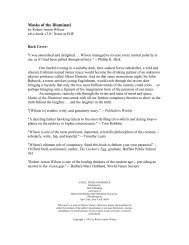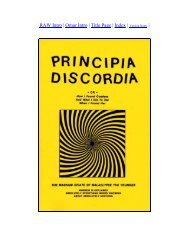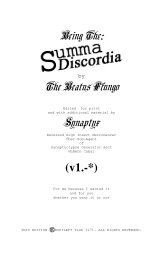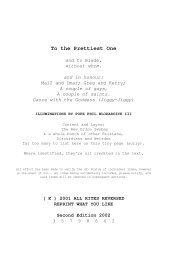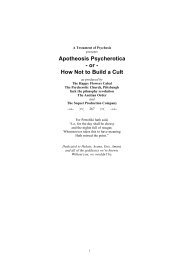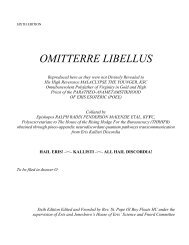Coincidance - Principia Discordia
Coincidance - Principia Discordia
Coincidance - Principia Discordia
Create successful ePaper yourself
Turn your PDF publications into a flip-book with our unique Google optimized e-Paper software.
COINCIDANCE 67<br />
ascribing predicates to groups. This takes the form. All k ,m r. K represents a<br />
class or set or group and x is the predicate quality (e.g., "crooked," "stupid,"<br />
"great sense of rhythm," "wise," "honest" or whatever).<br />
According to Korzybski (Science and Sanity) there is one field, and one field<br />
only, in which it is legitimate to ascribe predicates to groups—namely, in<br />
pure mathematics. This is legitimate because the groups or sets of pure<br />
math are purely abstract and created by definition. All k are x, in a<br />
mathematical context, because k and x are defined that way, and because<br />
they do not exist outside of pure thought.<br />
Once one leaves pure mathematics, the ascription of predicates to groups<br />
always introduces fallacy. Remarks about "all Jews," "all Blacks," "all<br />
women," "all men," "all plumbers," etc. are fallacies because the world<br />
consists of a phalanx of individuals. In Korzybski's handy notation, we never<br />
meet the groups; what we encounter are<br />
woman 1 woman 2<br />
woman 3 etc.<br />
plumber 1<br />
plumber 2 plumber 3 etc.<br />
When "mystics" etc. talk about ordinary consciousness as "sleep,"<br />
"dream,""illusion," etc., are they talking about something very esoteric that<br />
only other mystics can understand? Or are they talking about the extent to<br />
which normal consciousness ("mechanical consciousness" in my sense)<br />
relates to fictitious predicates attached to groups and ignores (does not<br />
perceive) person, person,, etc.?<br />
Is there some connection between "waking up" in the mystic sense, and<br />
learning to read (or to see paintings, say) in an alert, non-mechanical way?<br />
One Zen master, when asked what Zen "is," alaways replied with the<br />
single word, "Attention." What the hell did he mean?<br />
Scrutinize the following propositions:<br />
"Usury is a crime committed against all Aryans by all Jews." —A. Hitler.<br />
"[Rape] is nothing more or less than a conscious process of intimidation by<br />
which all men keep all women in a state of fear." —S. Brownmiller. [Italics in<br />
the original]<br />
To what extent do these propositions ascribe predicates to groups? To<br />
what extent do they represent "sleep," which ignores (does not perceive) e.g.<br />
the existential differences between }ew 1 Jew 2 , etc. man, man,, etc.?<br />
In San Francisco I read a review of John Huston's recent movie, Victory,<br />
which described it as "exciting." In the Irish Tribune yesterday I read another<br />
review which described it as "dull." Is the excitement or dullness "in" the<br />
movie, or was it in the nervous systems of the reviewers?<br />
Colin Wilson argues that when we say, "Life is boring and meaningless,"




